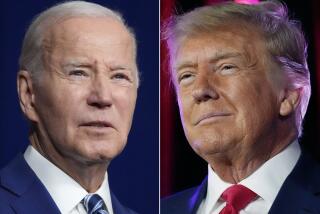Book review: ‘The Future of Power’ by Joseph S. Nye Jr.
In January, Chinese President Hu Jintao was in Washington. And while he and President Obama forged ahead on trade deals and wink-to-the-press bromides of cooperation, many Americans are not so optimistic about what China’s rise means. In a recent poll, 61% view China as “a threat to American jobs and economic security.” One increasingly hears the sotto voce warnings that our children will soon be learning Confucius at the feet of our new Chinese overlords.
Then again, maybe not. For geopolitical prognostications of a less alarmist varietal, with nuanced notes of optimism about U.S. ingenuity and leadership, try “The Future of Power.” In it, Joseph S. Nye Jr., Harvard professor and National Intelligence Council chair under President Bill Clinton, has distilled wide-ranging observations on how the power game will work in the 21st century and why America is poised to remain No. 1 if it plays it smart and heeds his advice. Whether it’s navigating the political waves of the Middle East or the diplomatic dance with China, the book offers a generous batch of insights.
Nye is famous for coining the phrase “soft power,” the foreign policy application of the old folk wisdom about winning more flies with honey than with vinegar. Now in his new book comes an updated catchphrase: “smart power, the combination of the hard power of coercion and payment with the soft power of persuasion and attraction.” It’s push and pull, carrots and sticks; the recognition, as Machiavelli would say, that it is truly best to be loved and feared.
But what’s really new is that this is the 21st century, where power is more multidimensional, more diffuse and hence more complicated. On top of nations and armies, there are more sprawling multinational corporations, more and more powerful nongovernmental organizations and disruptive terrorist networks.
And most important, there is the Internet, which is upending traditional power relations faster than people can write books about it. Take Egypt. Online activism played a key role in mobilizing anti-government protesters. Power doesn’t just grow out of the barrel of a gun anymore — it also grows out of a Facebook wall post and a Twitter feed. But only if 1,000 people pass it on.
In such an environment, Nye writes, leaders “need to think of themselves as being in a circle rather than atop a mountain.” Forget about power over others; the 21st century will be all about power with others, about organizing coalitions and solving collective action problems. “The world is neither unipolar, multipolar, nor chaotic,” he explains, “it is all three at the same time.”
And yet while the electrifying possibilities of diffusion have complicated the picture, nations still have the most resources, which still makes them the stars (for now). And no nation combines hard and soft power like America, whose open, innovative, democratic culture plus military might should keep it in first place in the Nye power rankings for years to come — assuming its leaders are smart enough to convert those resources into lasting alliances and international orders and not squander them on brash bullying.
By contrast, Nye assesses China as far weaker. Its political system lacks legitimacy, and the “Chinese economy faces serious obstacles of transition from inefficient state-owned enterprises, growing inequality, massive internal migration.”
Nye is a savvy and respected analyst, and he doesn’t disappoint here. He’s grappling with the hardest of questions, and though “The Future of Power” can at times read somewhat meanderingly, it’s the best kind of meandering: a learned journey through big ideas of what power means and how it is ever-evolving.
Drutman is a senior fellow at the Progressive Policy Institute in Washington, D.C.
More to Read
The biggest entertainment stories
Get our big stories about Hollywood, film, television, music, arts, culture and more right in your inbox as soon as they publish.
You may occasionally receive promotional content from the Los Angeles Times.





